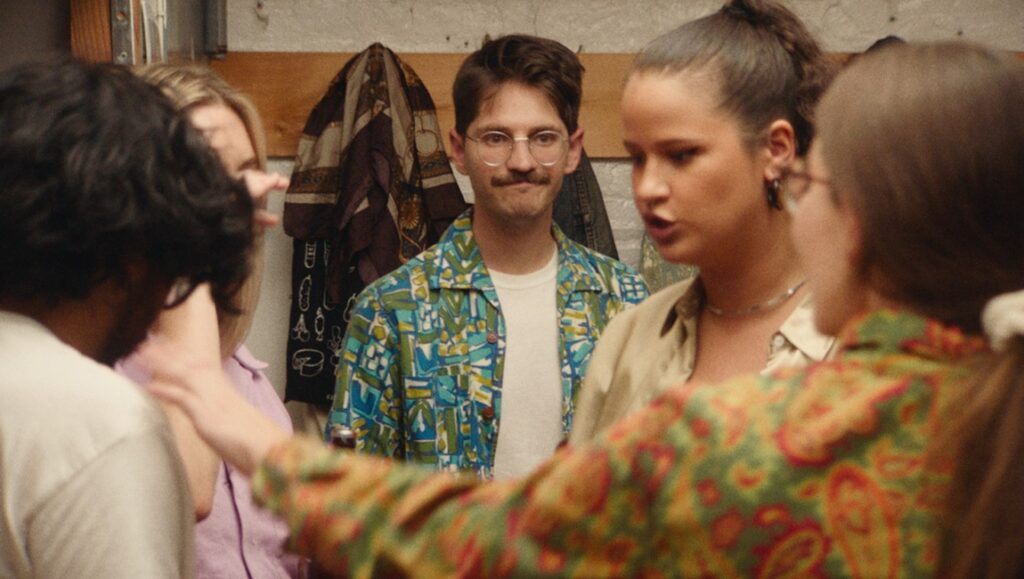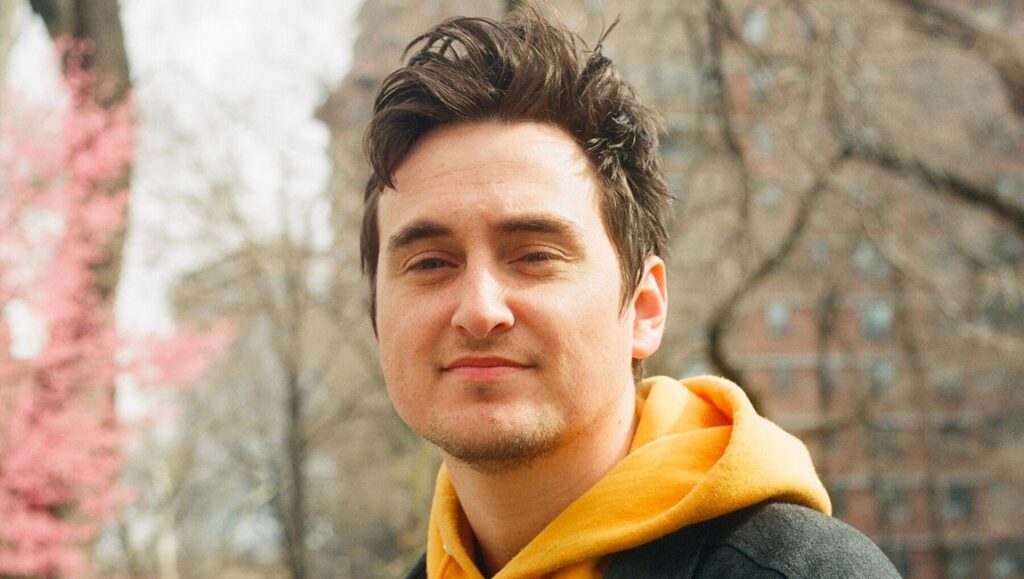Slackers have been the bread and butter of indie cinema since 90’s mainstays like Clerks and Slacker helped jumpstart the whole modern American independent film scene in the first place. For young artists and bohemians drawn to filmmaking, that stultifying sense of dissatisfaction and aimlessness key to the slacker is a prescient point from which to examine the trappings of a capitalist culture hooked on the protestant ethic. In Free Time, the first feature film by Ryan Martin Brown, the slacker is wonderfully updated for today’s life-is-work corporate culture. Opening with data analyst Drew (Colin Burgess) quitting his job on a whim, the film explores how this Bartleby-like gesture of resistance rubs up against the constant anxiety and need for fulfillment of our era.
Made on the fly by a group of friends, Free Time joins recent micro-budget successes like Justin Zuckerman’s Yelling Fire in an Empty Theater and Tynan Delong’s Dad and Step-Dad as examples of a thriving Brooklyn regional film scene. That Zuckerman produced Free Time, Brown produced Yelling Fire, and Colin Burgess also starred in Dad and Step-Dad only strengthens the matter. I sat down with Brown and Free Time producer Mackenzie Jamieson to talk about the film, eager to learn about the director’s process and how he managed to pull it off.
Joshua Bogatin: Did you ever think about pitching the movie or did you always know it was going to be so small-scale and independent?
Ryan Martin Brown: Well there was a bigger movie that I was writing originally. I was writing it for Jessie Pinnick, who’s in this movie, but in a smaller role. It’s thematically similar, but it became clear that it was just a little too big to take on. For a movie that was going to be totally based on getting locations for free and shooting at friends of friends’ houses, doing something bigger wasn’t possible. Doing this movie at all came from a very naive idea that we could just do this as a toss-off movie, an extended weekend project and afterwards we would do a real movie in a year. So the spirit of it was almost stupidly relaxed, but as we got into it, we realized it was going to be a little bit more serious than that.
Mackenzie Jamieson: There were a couple days in prep where I felt like I don’t think I’ve ever been more stressed in my life, but for the months leading up to it I was completely like “this is awesome, this is so fun.” And it was.
RMB: I think we came out of the pandemic and we had kind of forgotten everything about how hard the experience of making a movie can be. We just had this idea that we’re just showing up at a place with a camera and different people are coming, but of course complications arise.
MJ: Once we were in production and the ball was rolling, there was just no stopping us. Certain days were harder than others, the run-and-gun days were really fun and really easy for me, but I guess they were much harder for you and Victor [Inglés, the cinematographer]. Everyone on the crew was so down for it and that made it really fun.
RMB: I think we had the benefit of coming out of Covid where everyone was so excited to just get together with people and do something. No one had a job and everyone was hungry for some sort of communal experience, which was lucky for us. It wasn’t too stressful overall, but it was fast. I was definitely not used to the speed that we went at in order to do that much in a day.
JB: Mackenzie, it was your first time producing, why did you decide to do it?
RMB: Yeah, a job that people generally don’t enjoy doing.
MJ: I really liked working with Ryan on Yelling Fire in an Empty Theater, and I really liked the script. The way that Ryan pitched my role to me was that I would be managing people and casting personalities. It felt like that’s something I knew how to do. Then everything else I feel like I learned by watching the others. I’ve produced so much since then that I wish I could go back and be the producer I am now for the film.
RMB: It was your first time producing, but it was also everyone’s first time making a feature really. We made Yelling Fire, but I wouldn’t really call that learning the lessons you need to learn to make a feature because it was literally just showing up at an apartment and doing it. So on Free Time, there was an atmosphere of us all figuring it out together.
Mackenzie was the first one on, and that was the pitch to her. I thought she was great at bringing people together, and because of what the challenges of the script were, the real thing we needed to pull off was getting people to show up every day. I think the only part that sucked about it was that we had to load all the equipment up a three-story walk-up every night. I think in the future we would splurge for some lotted parking.

JB: Do you feel like New York is a very present character in the film?
RMB: Yeah, I think the idea of the movie was that the environment would be a lot of it. We were talking a lot about Éric Rohmer and thinking about how beautiful and romantic he makes the life of a young person in Paris look. So it was funny if our character was in the most romantic version of New York, but he just can’t do anything. The Heartbreak Kid was also one of our guiding lights. That’s another movie where the location is so prevalent. I always forget it’s a Miami movie, but that’s such a significant part of it. Colin [Burgess] also took a lot from it; in his head he was really going full Charles Grodin.
JB: Can you talk about the character and where the idea for the film came from?
RMB: It came from this interesting idea of having someone get exactly what they want at the beginning of the movie and then watching them figure out how they were supposed to deal with it. I was writing another movie where the character was supposed to be completely unreadable, which made it really hard to write because people wouldn’t understand her at all. This was a bit of an escape and a chance to do the opposite. He’s saying out loud all the time what he’s struggling with, and it’s very readable. It also came from knowing Colin a little bit — he’s a pretty readable guy.
JB: He has a lot of neurotic energy. He’s very fidgety and anxious, but also knows how to let himself go like most good actors.
MJ: I remember shooting the monologue after he fails to get his job back. He was crushing it take after take, and the first time we went from rehearsal to shooting I teared up. Watching someone be so good at what they’re doing was just so cool. It’s when I realized that this movie was truly going to work.
JB: Did you do a lot of improv?
RMB: Yes, but not from the ground up because of time. There were certain things that we knew we needed to hit and otherwise it was fine. The actor playing the guy yelling on the street showed up the morning of and gave us a completely different rant, which he had written on the train over, and it was so much better. Some people felt more comfortable moving away from the script, some didn’t.
I think Colin’s got a great internal rhythm. I think the only scene where he got out of control was in the band rehearsal scene. Alex Bliss just kept improvising and needling Colin, but Colin really wouldn’t take it so he just had to fire something back, and then they just kept at each other on and on. That was the only example of perhaps too much improv.

JB: It’s interesting you brought up Elaine May because I think a lot of the uncertainty amongst the characters which you’re talking about comes from these improvs that just spiral out. She would shoot a scene for a week or two and waste tons and tons of film on nothing, but how do you, in a more limited way, try to get a sense of spontaneity and ambiguity in the character?
RMB: The shooting style helped a lot. This was the beautiful side effect of me getting obsessive with Robert Altman. All of his movies are shot with very little coverage, and he lets many scenes just play out in these moving masters, often in profile. It creates a lot of freedom because you can do one take and the next and they don’t have to be the same thing. And even if you’re cutting around, you can get really loosey-goosey without losing the thread. Even though we had to be quick, we also had an atmosphere on set where things didn’t have to be insanely precise or match-up. And yes, there are instances that created headaches in the edit, but ultimately it wasn’t that big of a deal.
I remember doing the scene with Jessie [Pinnick] in the apartment, and they were doing dramatically different things from take to take, going to different places in the apartment to do the scene. It was a bit much, but ultimately it cut together. We maybe had to lose a line or two in some places, but it’s fine. Freedom helps a lot, as does giving the actors room to feel like they can do whatever they want.
JB: I loved that scene with Jessie Pinnick. I felt like her character had such a strong sense of ambiguity and mystery to it.
RMB: When you meet someone who’s a great actor, it’s mystifying. While writing we kept wondering if we should cut it or not because it read flat and felt a bit like a placeholder; we didn’t have a real sense of who the character was. She brought so much to it and really found why the character would do it. It gave us a thrill to watch her and Colin together. It was nice to just pair different actors up like that.
JB: Do you have another film in the works?
RMB: Not really. It’s hard to have a life where you make movies and enjoy it and also think about the needs of a career. It really sucks trying to do both things. You kind of have to do both things because movies aren’t an affordable hobby, but they’re two counter-intuitive ways of thinking about things.


Comments are closed.